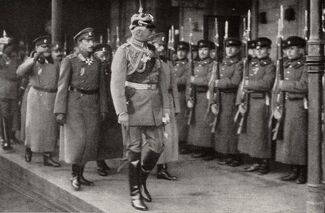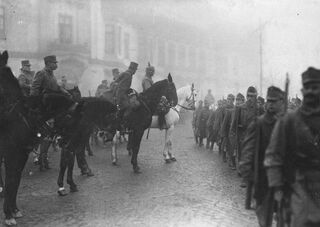Anton Ludwig August von Mackensen (Born 6 December 1849), born August Mackensen, is a German field marshal and current Generalfeldmarschall of the Deutsches Heer. He commanded with extreme success during the Weltkrieg and became one of the German Empire's most prominent and competent military leaders. After the war he has remained one of the leading figures behind the German military doctrin, based on his experience gained during the war.
Early years[]
Mackensen was born in Haus Leipnitz, near the village of Dahlenberg in the Prussian Province of Saxony, to Louis and Marie Louise Mackensen. His father, an administrator of agricultural enterprises, sent him to a Realgymnasium in Halle in 1865, seemingly in the hope that his eldest son would follow him in his profession.
Mackensen began his military service in 1869 as a volunteer with the Prussian 2nd Life Hussars Regiment (Leib-Husaren-Regiment Nr. 2). During the Franco-Prussian War of 1870-1871 he was promoted to second lieutenant and won the Iron Cross Second Class for leading a charge while on a reconnaissance patrol north of Orleans. After the war he left the service and studied at Halle University, but returned to the army in 1873 with his old regiment.
He married Doris (Dorothea) von Horn, the sister of a slain comrade, in 1879. Her father Karl von Horn was the influential Oberpräsident of East Prussia; they had two daughters and three sons. In 1891 Mackensen was appointed to the General Staff in Berlin, bypassing the usual three-year preparation in the War Academy. His chief, the great Helmuth von Moltke, found him a "lovable character". He was recalled from the regiment to serve as an adjutant to the next chief, Alfred von Schlieffen (in office 1891-1906), whom he regarded as a great instructor on how to lead armies of millions.
He impressed Kaiser Wilhelm II, who ordered that Mackensen be given command from 17 June 1893 of the 1st Life Hussars Regiment (Leib-Husaren-Regiment Nr. 1), to which he became à la suite when he left its command on 27 January 1898, so he often wore the distinctive death's head uniform thereafter. Mackensen was surprised by his next posting, as an adjutant to Wilhelm II, because he was the first commoner to hold that position. For the next three and a half years he shadowed the Kaiser, meeting the high and mighty of Germany, the rest of Europe, and the Middle East. His sons shared gymnastics classes with the Kaiser's. He was ennobled on the Kaiser's 40th birthday, 27 January 1899, becoming August von Mackensen. Next he received the command of the newly created Life Hussar Brigade (Leib-Husaren-Brigade) from 1901 to 1903, and from 1903 to 1908 commanded the 36th Division in Danzig. He became a widower in 1905, and two years later married Leonie von der Osten, who was 22 years old. When Schlieffen retired in 1906, Mackensen was considered as a possible successor, but the job went to Helmuth von Moltke the Younger. In 1908 Mackensen was given command of the XVII Army Corps, headquartered in Danzig. The Crown Prince was placed under his command, and the Kaiser asked Mackensen to keep an eye on the young man and to teach him to ride properly.
During the Weltkrieg[]
Already aged sixty-five at the outbreak of War in 1914, Mackensen's XVII Army Corps became part of the German Eighth Army in East Prussia, under General Maximilian von Prittwitz and 21 days later under General Paul von Hindenburg. Mackensen had his corps moving out on a twenty-five kilometer march to the Rominte River within fifty minutes of receiving his orders on the afternoon of 19 August 1914 when the Imperial Russian Army invaded East Prussia. He led XVII Corps in the battles of Gumbinnen, Tannenberg and the First Battle of the Masurian Lakes, which drove the invading Russians out from most of East Prussia.
On 2 November 1914 Mackensen took over command of the Ninth Army from Hindenburg, who became Supreme Commander East (Oberbefehlshaber Ost). On 27 November 1914 Mackensen was awarded the Pour le Mérite, Prussia's highest military order, for successful battles around Łódź and Warsaw.
By April 1915 the Russians had conquered all of western Galicia, the Austro-Hungarian slice of partitioned Poland, and were pushing toward Hungary. In response to desperate pleas the German supreme commander Erich von Falkenhayn agreed to an offensive against the Russian flank by an Austro-German Army under a German commander. The reluctant Austro-Hungarian supreme command agreed that the tactful Mackensen was the best choice for commanding the coalition army. Army Group Mackensen (Heeresgruppe Mackensen) was established containing a new German Eleventh army, also under his command, and the Austro-Hungarian Fourth Army. As chief of staff he was assigned Hans von Seeckt, who described Mackensen as an amiable, "hands-on commander with the instincts of a hunter.” His army group, which had an overwhelming advantage in artillery, smashed through the Russian lines between Gorlice and Tarnow and then continued eastward, never giving the Russians time to establish an effective defense, retaking most of eastern Galicia by recapturing Przemyśl and Lemberg. The joint operation was a great victory for the Central Powers, they had advanced 310 km (186 mi), and soon thereafter the Russians pulled out of all of Poland.
Mackensen was awarded oak leaves to his Pour le Mérite on 3 June 1915 and promoted to field marshal on 22 June. He also received the Order of the Black Eagle, Prussia's highest-ranking order of knighthood, as well as numerous honors from other German states and Germany's allies, including the Grand Cross of the Military Order of Max Joseph, the highest military honor of the Kingdom of Bavaria, on 4 June 1915.
Serbian Campaign[]

August von Mackensen inspects Bulgarian troops (1916)
In October 1915, a new Army Group Mackensen (Heeresgruppe Mackensen, which included the German Eleventh Army, Austro-Hungarian Third Army, and Bulgarian First Army), launched a renewed campaign against Serbia. The campaign crushed effective military resistance in Serbia but failed to destroy the Serbian army, half of which managed to withdraw to Entente-held ports in Albania and, after recuperation and rearmament by the French and the Italians, reentered fighting on the Macedonian front. When Mackensen returned to Vienna he was honored by a dinner, a personal audience with the Emperor Franz Joseph and was decorated with the magnificently jeweled Military Service Cross 1, a unique award for a foreigner.
Romanian Campaign[]

August von Mackensen enters Bucharest
After Romania declared war on Austro-Hungary on 15 August 1916, Mackensen was given command of a multi-national army, with General Emil von Hell as chief of staff, of Bulgarians, Ottomans, Austro-Hungarians and Germans which assembled in northern Bulgaria and then advanced into southern Romania. By 8 September they had taken the two major forts on the right bank of the Danube, the first in a single day by a force that was outnumbered by the besieged, who were overwhelmed by Mackensen's artillery. Then a German and Austro-Hungarian army group, commanded by Falkenhayn broke into northern Romania through the passes in the Transylvanian Carpathian mountains, while Mackensen crossed the Danube by seizing bridgeheads on the left bank to shield the Austro-Hungarian engineers who built the long pontoon bridge. The Romanian army and their Russian allies were forced back between these pincers, Bucharest fell to Mackensen on 6 December, 1916, his 67th birthday, he rode in on a white horse and moved into the royal palace.
By December 1917, the Russian Army had collapsed and Romania was forced to sign the Armistice of Focșani, followed by the Bucharest Peace Treaty.
Operation Teutoburg[]
Following his previous victories in the Balkans, Mackensen was given command over a multi-national army to carry out Operation Teutoburg in 1918 to close the Greek front by pushing the Entente out of their last stronghold in the Balkans. The combined German/Austrian/Bulgarian attack on Greece and the Salonika beach-head made use of new attack methods trialed previously in the attack on Riga, which involved the use of small storm trooper squads infiltrating enemy lines ahead of the main advance. Once again the new tactics proved very successful. While the Austrians and Bulgarians pinned down the allied forces at Salonika the German divisions swept through Greece. Athens fell on July 3rd and Britain soon had to mount an evacuation operation to extract the remnants of the Greek army from the Peloponnese. Mackensens forces took the remeining parts of Greece in early 1919 after the bulk of the British, French and Italian forces had withdrawn without heavy fighting.
Career after the Weltkrieg[]
After the Welkrieg August von Mackensen was among the most highly decorated wartime commanders. Having avoided overly close ties with de-facto dictator Erich Ludendorff, Mackensen was not associated with the Osthilfeskandal. Grand Admiral von Tirpitz, after his selection as Chancellor of Germany, suggested Mackensen as the new head of the Deutsches Heer. The Kaiser appointed Mackensen to his current position on 23 September 1923.
